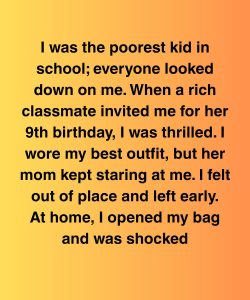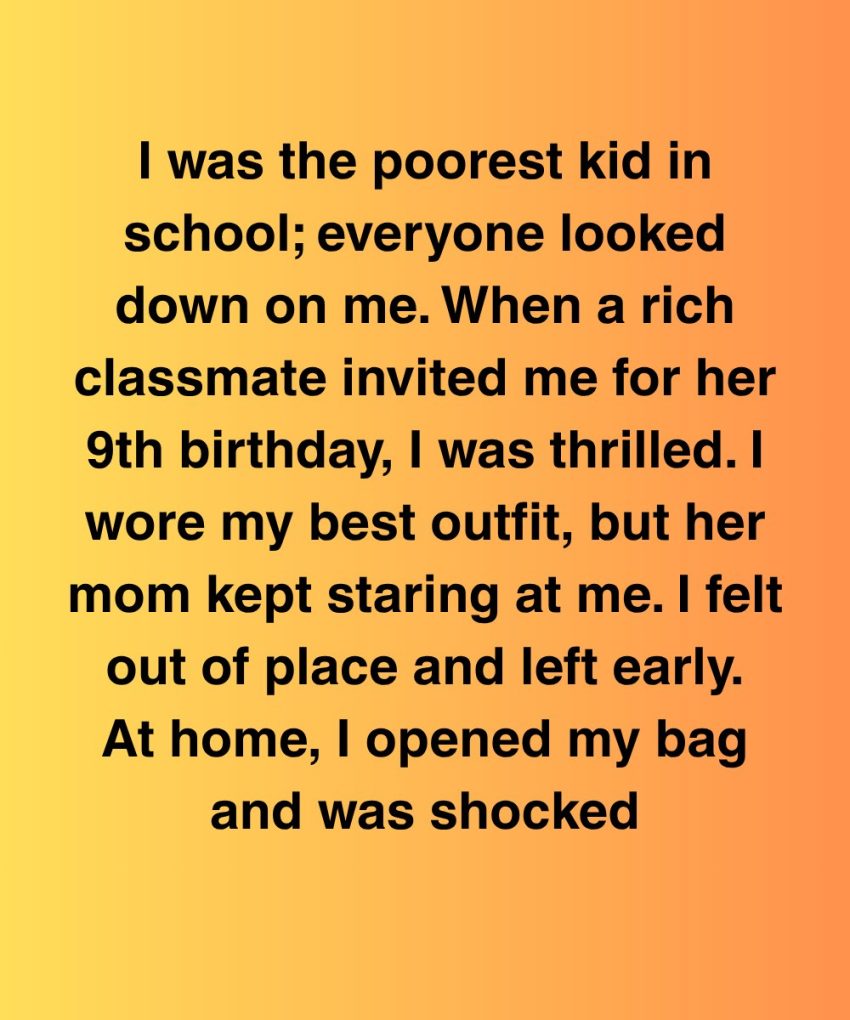People looked down on me because I was the poorest kid in school. I was so happy when a rich classmate asked me to her ninth birthday party. I wore my best clothing, yet her mom kept looking at me. I left early since I didn’t fit in. I was astonished when I went home and unzipped my bag.
There was a small, glittery bag for beauty with a shiny hairpin and some bracelets inside. There was no way these were mine. I paused. The first thing that sprang to me was that someone must have put it in my bag. What if they think I took it? That was the second thing that sprang to mind.
Holding the sack made my heart rush. It smelled like perfume, but not the kind you can only purchase in department stores. I didn’t even have a hairpin, much less one with fake diamonds on it. I wanted to march back to the party and give it back, but it was too late. My mom had to work at night and wouldn’t be home till the next day.
I didn’t get much sleep. The next day at school, I brought the pouch with me and was ready to give it back without making a fuss. Before I could give it back, though, I saw a big throng of people around Zariah, who was the birthday girl. Her mom was there too, but she was chatting to the teacher in a low voice. After that, the teacher said my name.

We went into the hall. My stomach felt like it was becoming smaller. The teacher’s voice was low, but it was clear what she was saying: Zariah’s mom said she saw me staring at the present table for too long, and now one of Zariah’s gifts was missing. My throat got dry.
I told them I had it, but I didn’t mean to take it. When I tried to explain, Zariah’s mother stared at me like I was lying. The teacher seemed worried and didn’t want to upset me or break the peace. She told me to give it to her and “learn from this.” I still remember the phrase, “learn from this.”
People found out about it right away. The kids were still. Some folks laughed when I walked by. A boy murmured “thief” under his breath. I used to be the “poor girl,” but now I was the “poor thief.” The two labels stuck together like glue.
For weeks, I ate lunch alone. Zariah didn’t talk to me. Kids I had never talked to before didn’t want to be around me. My grades dropped because I couldn’t focus. Every time the teacher asked a question, I thought everyone was looking at me. I wanted to leave.
Ananya, a bashful girl who sat in the back, didn’t believe the reports, though. She didn’t try to make me feel better by saying things that didn’t matter. She just sat with me and shared part of her lunch one day. That small thing made a great difference. We started talking to each other more. She never asked about the bag directly, but I could tell she didn’t trust what everyone else did.
It took months. I thought it was all over until the talent show at school. I didn’t want to help Ananya make props for her dance performance, but she pulled me into it. While I was backstage putting stars on a cardboard moon, I heard two girls laughing.
“Putting it in her bag was so funny,” one of them said.
I was stuck.
The other girl laughed. “She looked so scared!” And Mrs. B believed it right away because, you know, she’s poor.
There was Zariah’s voice.
My hands were trembling. I peeked through the curtain and saw her smiling with a different companion. It seemed like a prank that wasn’t meant to hurt anyone. My ears hurt.
I wanted to leave and yell at her in front of everyone, but I didn’t. People didn’t believe me before, so why would they now? I needed proof.
I sat there.
The next day, I asked Ananya for help. We started to pay attention to Zariah during lunch. She liked to play tricks on others, like switching their pencils or hiding their lunch boxes. It wasn’t a major thing, but it showed a pattern. Then, on a Friday, we got lucky.
Zariah grabbed a hair clip from another girl’s desk and put it in a backpack without that person knowing. This time, Ananya had her phone out because she was trying to record parts of lunch for a “day in the life” project. She witnessed it everything.
I knew it wasn’t the same as the birthday pouch, but it was enough to show how she acted. We gave the teacher the video. This time, she couldn’t ignore it.
I met Zariah’s parents. The teacher didn’t say exactly what occurred to me, but I could tell she was looking at me when she talked about how bad it is to accuse someone without proof. Zariah was told to apologize to the girl she had set up. She said she was sorry in a way that was hard to hear.
That weekend, I thought a lot about whether or not to tell my story. But then something weird happened: on Monday, Zariah completely ignored me. Some kids who had ignored me before started talking to me again. They didn’t admit they were wrong, but they did stop calling me names.
Things never went back to how they used to be. In some ways, it was better. I didn’t have as many friends, but the ones I did have were real. Ananya and I got to know each other well. We started working on school projects together and even went to each other’s homes.
The birthday party, the purse, and the looks are still fresh in my mind after all these years. But I also remembered the time when I understood that some people will never acknowledge they were wrong and that they don’t necessarily have to do so to move on.
After I finished from college, I traveled back to my hometown to visit my folks for the summer. I walked to the café near my house and saw Zariah, a face I remembered, behind the counter. She seemed astonished when she saw me. We talked in a nice way. She said she was putting money up to go back to school. There was no hint of the rich, untouchable birthday girl left.
She got in touch with me after I left. “Hey, about that birthday thing…” She came to a stop. “I was a kid.” I was dumb.
The apology was good enough for me, even though it didn’t have any tears or real regret. I nodded and said, “We were kids.” It’s fine. And for the first time, it was truly fine.
That day, I discovered that getting angry only makes you feel worse. The people who harm you might not pay the way you think they should, but life has a way of setting things right. Zariah was no longer the center of attention; she was just another person in the crowd. I had built a life that made me happy.
If I could tell my younger self one thing, it would be this: people who don’t understand you don’t get to judge how much you are worth. Sometimes the best way to get back at someone is to live a happy life and let time do its thing.
We can’t control how other people treat us, but we can control how much space they take up in our lives. And sometimes that’s all you need to get over it.
If this story spoke to you, send it to someone who has been unfairly criticized. They could need the reminder as well.
